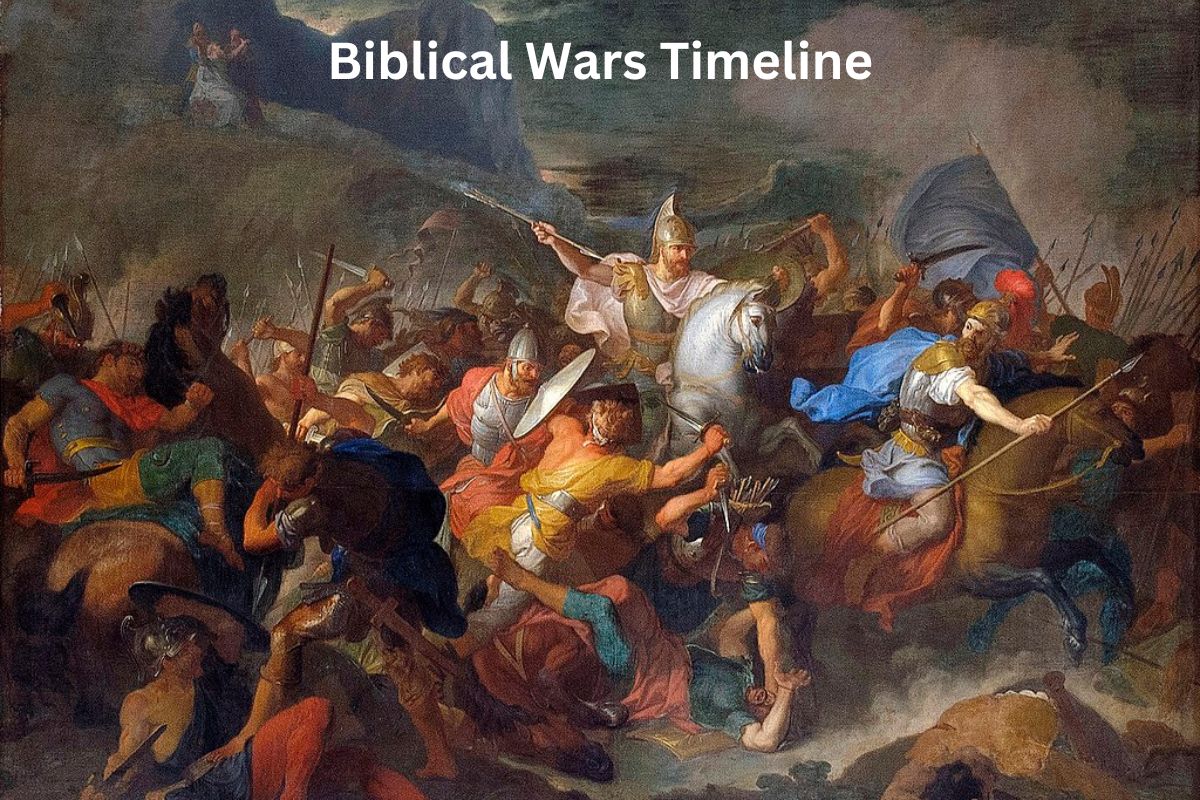The Bible, a sacred text for both Judaism and Christianity, contains a rich tapestry of historical accounts, allegorical narratives, and religious teachings.
Among its many themes, the Bible features numerous accounts of wars and conflicts that have shaped the history, culture, and faith of the ancient Israelites and, by extension, the Western world.
In this timeline, we explore pivotal events from the biblical narrative, from the cosmic battle in heaven to the earthly struggles of ancient Israel.
We journey through the Great Flood, the Tower of Babel, the conquest of Canaan, the rise of King David and King Solomon, the division of Israel, and encounters with formidable empires like Assyria and Babylon.
These events are not only significant in the context of biblical history but also hold enduring relevance in the broader understanding of the ancient Near East.
The timeline also takes us to the time of Jesus, whose teachings and crucifixion are foundational to Christianity. Additionally, we delve into the Jewish-Roman Wars, which had profound consequences for the Jewish people and the course of history.
| Event | Approximate Date |
|---|---|
| War in Heaven (Rebellion of Lucifer) | Before the creation of Earth (dates not specified in the Bible) |
| The Flood (Noah’s Ark) | Approximately 2348 BCE (based on biblical genealogies) |
| The Tower of Babel | After the Flood, but specific date not mentioned |
| Conquest of Canaan | Approximately 1400-1200 BCE (varies by biblical book) |
| – Joshua’s Conquest | Approximately 1400-1375 BCE |
| – Judges Period | Approximately 1375-1050 BCE |
| David and Goliath | Approximately 1000 BCE |
| Solomon’s Reign | Approximately 970-931 BCE |
| The Split of Israel | After Solomon’s death, around 930 BCE |
| Assyrian Conquests | Various campaigns by the Assyrian Empire against the Northern Kingdom of Israel (8th century BCE) |
| Babylonian Conquest and Exile | 586 BCE (destruction of Jerusalem and the First Temple) |
| Return from Exile and Rebuilding of the Second Temple | Starting in 538 BCE |
| Maccabean Revolt | 167-160 BCE |
| Roman Conquest of Judea | 63 BCE (Pompey the Great captures Jerusalem) |
| Life of Jesus | Approximately 4 BCE – 30-33 CE |
| Jewish-Roman Wars | |
| – First Jewish-Roman War (Great Jewish Revolt) | 66-73 CE (destruction of Second Temple in 70 CE) |
| – Second Jewish-Roman War (Bar Kokhba Revolt) | 132-135 CE |
Timeline of the Biblical Wars
War in Heaven (Rebellion of Lucifer):
This event is not described in great detail in the Bible, but it is traditionally understood as a rebellion led by Lucifer (often identified with Satan) and a group of angels against God in Heaven. It is believed to have occurred before the creation of the Earth.
The rebellion resulted in the expulsion of Lucifer and his followers from Heaven, leading to their becoming fallen angels or demons.
The Flood (Noah’s Ark):
The Great Flood is one of the most well-known stories in the Bible. According to the Book of Genesis, God decided to flood the Earth to cleanse it of wickedness and corruption. God instructed Noah, a righteous man, to build an ark to save himself, his family, and a pair of every kind of animal on Earth.
The flood lasted for 40 days and 40 nights, covering the entire Earth in water. After the floodwaters receded, Noah and the animals left the ark, and God established a covenant with Noah, promising never to destroy the Earth by flood again.
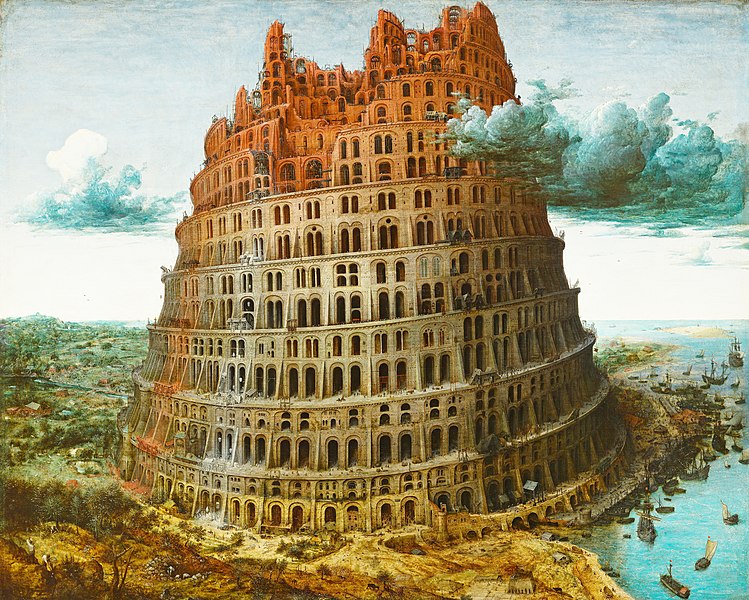
The Tower of Babel:
This story is also found in the Book of Genesis. After the flood, humanity began to multiply and settle in the land of Shinar. The people decided to build a great tower, the Tower of Babel, as a symbol of their unity and power. However, their intention was seen as an act of pride and rebellion against God.
In response, God confused their language, causing them to speak different languages, which made communication impossible.
As a result, the people scattered and dispersed across the Earth. The Tower of Babel story is often seen as an explanation for the diversity of languages and the dispersion of humanity across the world.
Conquest of Canaan
Joshua’s Conquest (Approximately 1400-1375 BCE):
After the death of Moses, Joshua led the Israelites in the conquest of the Promised Land of Canaan, which had been inhabited by various Canaanite tribes.
The Book of Joshua describes the miraculous crossing of the Jordan River, the fall of the city of Jericho, and the gradual conquest of the land. The conquest was a central event in the history of the Israelites, as it marked their establishment in the land promised to them by God.
Judges Period (Approximately 1375-1050 BCE):
Following the conquest under Joshua, the Israelites entered a period known as the Judges period. During this time, the Israelites were ruled by a series of judges who were chosen by God to lead and deliver them from various oppressors and enemies.
The Book of Judges contains stories of these judges, including figures like Deborah, Gideon, and Samson. The period was marked by cycles of disobedience, oppression, repentance, and deliverance.
David and Goliath (Approximately 1000 BCE):
The story of David and Goliath is one of the most famous and iconic episodes in the Bible. David, a young shepherd, defeated the giant Philistine warrior Goliath with a sling and a stone.
This victory catapulted David into prominence, eventually leading to his anointment as king of Israel. David’s reign would become known for its military victories, expansion of the kingdom, and his role in establishing Jerusalem as the capital.
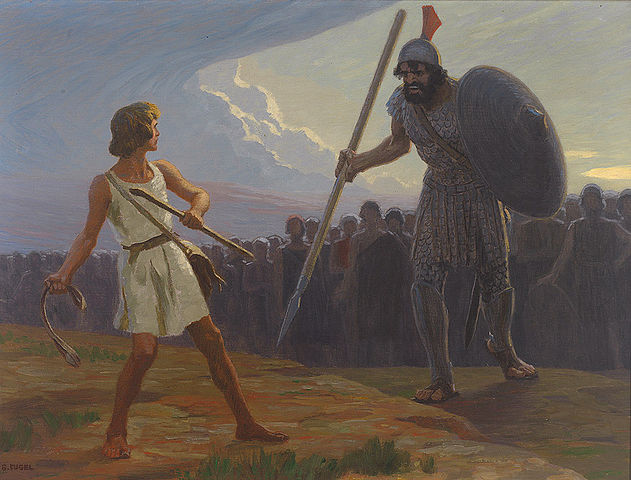
Solomon’s Reign (Approximately 970-931 BCE):
Solomon, the son of David, is often regarded as one of the wisest and wealthiest kings in biblical history. His reign is characterized by several significant achievements:
Building of the First Temple: Solomon is credited with constructing the First Temple in Jerusalem, which became the central place of worship for the Israelites. This temple housed the Ark of the Covenant and symbolized the presence of God among His people.
Wisdom and Wealth: Solomon is famous for his wisdom, exemplified in the well-known story of the two women claiming to be the mother of the same baby. His wisdom attracted people from far and wide. Additionally, Solomon’s reign was marked by great prosperity and trade, bringing immense wealth to the kingdom.
International Alliances: Solomon formed diplomatic alliances with neighboring kingdoms, including Egypt and Tyre. These alliances brought economic benefits and stability to the region during his reign.
Literary Contributions: Solomon is traditionally credited with writing several biblical books, including Proverbs, Ecclesiastes, and the Song of Solomon (Song of Songs).
The Split of Israel (Around 930 BCE):
After the reign of Solomon, his son Rehoboam ascended to the throne. However, his heavy-handed policies led to the division of the United Kingdom of Israel into two separate kingdoms:
- The Northern Kingdom of Israel: This kingdom, with its capital in Samaria, was comprised of ten tribes and was ruled by a series of kings. It often faced conflicts with neighboring kingdoms, including the Assyrians.
- The Southern Kingdom of Judah: This kingdom, centered around Jerusalem, was made up of the tribes of Judah and Benjamin and retained the line of Davidic kings. It maintained a more stable existence compared to the Northern Kingdom but also faced threats from surrounding nations.
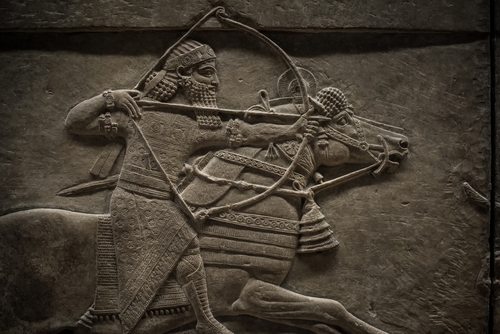
Assyrian Conquests:
During the 8th century BCE, the mighty Assyrian Empire embarked on a series of campaigns to conquer various parts of the ancient Near East, including the Northern Kingdom of Israel. In 722 BCE, the capital of the Northern Kingdom, Samaria, fell to the Assyrians, leading to the exile of many Israelites.
Babylonian Conquest and Exile (586 BCE):
The Southern Kingdom of Judah also faced a tragic fate. In 586 BCE, the Babylonian Empire, under King Nebuchadnezzar II, besieged and destroyed Jerusalem, including Solomon’s Temple (the First Temple).
This event marked the beginning of the Babylonian Exile, during which many Judeans were taken captive to Babylon. This period had a profound impact on Jewish identity, as it led to the development of synagogues and a stronger focus on religious and cultural preservation.
Return from Exile and Rebuilding of the Second Temple (Starting in 538 BCE):
After the fall of Babylon to the Persian Empire, Cyrus the Great issued a decree allowing the Jewish exiles to return to their homeland and rebuild the Temple in Jerusalem. This marked the beginning of the Persian period in Jewish history.
The construction of the Second Temple was completed in 515 BCE, and it became the center of Jewish worship until its eventual destruction by the Romans in 70 CE.
Maccabean Revolt (167-160 BCE):
The Maccabean Revolt, also known as the Maccabean Uprising or the Hasmonean Revolt, was a Jewish rebellion against the Seleucid Empire. Antiochus IV Epiphanes, the Seleucid king, had imposed Hellenistic practices and religious persecution on the Jewish population in Judea.
Led by Judah Maccabee and his brothers, the Jewish rebels successfully fought for religious freedom and independence. They rededicated the desecrated Second Temple in Jerusalem, an event commemorated in the festival of Hanukkah.
The Maccabean Revolt led to the establishment of the Hasmonean dynasty, an independent Jewish kingdom in Judea.
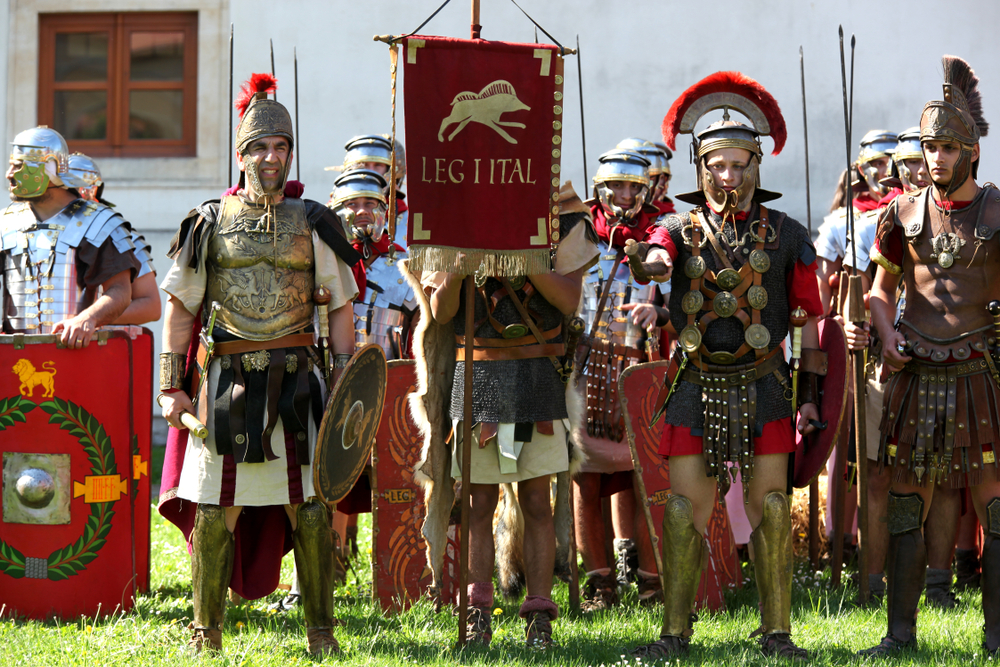
Roman Conquest of Judea (63 BCE):
In 63 BCE, the Roman general Pompey the Great captured Jerusalem, bringing Judea under Roman control. This marked the beginning of Roman rule in the region, and Judea became a client kingdom of the Roman Republic and later the Roman Empire.
The situation in Judea was complex, with periods of relative autonomy and moments of tension, which eventually led to further conflict.
Life of Jesus (Approximately 4 BCE – 30-33 CE):
Jesus of Nazareth, a central figure in Christianity, lived during the 1st century CE. His life and teachings are recorded in the New Testament of the Christian Bible.
Jesus’ ministry included the preaching of moral and spiritual principles, the performance of miracles, and the gathering of followers known as disciples. His crucifixion by Roman authorities in Jerusalem and subsequent resurrection are foundational events in Christian theology.
Jewish-Roman Wars:
First Jewish-Roman War (Great Jewish Revolt, 66-73 CE):
The First Jewish-Roman War was a major conflict between the Jewish population in Judea and the Roman Empire. It began with a Jewish uprising against Roman rule and culminated in the destruction of the Second Temple in Jerusalem in 70 CE by the Roman general Titus.
The war concluded with the fall of the Jewish fortress of Masada in 73 CE. The defeat had a profound impact on Jewish history, leading to the diaspora and the dispersion of Jews throughout the Roman world.
Second Jewish-Roman War (Bar Kokhba Revolt, 132-135 CE):
The Bar Kokhba Revolt was another Jewish rebellion against Roman rule, led by Simon bar Kokhba. The Jews aimed to establish an independent Jewish state in Judea.
The revolt was brutally suppressed by Roman forces, and the Roman Emperor Hadrian imposed harsh measures, including the renaming of Jerusalem and banning Jews from entering the city. The aftermath of the revolt further solidified the Jewish diaspora.
